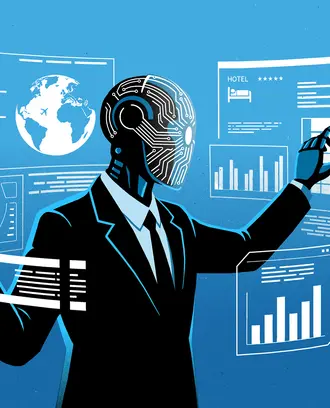Digital Economy
6 ideas reframing the digital age from MIT Sloan Management Review
Managers must stay on top of digital trends. These articles will help.
The digital era requires managers to embrace technology, but it also brings up a lot of questions. Is your company taking advantage of artificial intelligence? Should you be worried about the ethics of the machines in your office? Is your digital platform growing too fast? Here are six new ideas from MIT Sloan Management Review that might offer some answers.
Measuring culture in leading companies
1.2 million employee reviews, 500 companies, nine cultural values, one very helpful dataset.
MIT Sloan Management Review, in partnership with company-review website Glassdoor, recently unveiled an online database with information on more than 500 large companies around the world.
Using machine learning and human research, the partners built an interactive tool that allows users to see how some of the world’s most renowned companies stack up when it comes to values like diversity, respect, innovation, integrity, and agility.
Explore the dataset.
Building digital-ready culture in traditional organizations
Modeling your company after uber-successful digital companies like Amazon — or, well, Uber — might seem like a good idea, but applying Silicon-Valley standards to established companies is neither easy nor always the right path to take.
If you do want to prepare your business to be digital-ready, consider the framework built by George Westerman, a senior lecturer at MIT Sloan; Deborah L. Soule, a research consultant at MIT Sloan; and Anand Eswaran, corporate vice president of enterprise at Microsoft.
Here are a few principles they suggest for creating a digital-ready culture:
- Encourage failing fast and sharing learnings.
- Help employees keep their skills current through training and stretch assignments.
- Actively and visibly discourage people who use rules to hold up necessary action.
Read more about the framework.
Customer centricity in the digital age
Customers are at the heart of retail, and companies are increasing their use of machines to help learn more about their human consumers.
“With the help of AI, companies collect as much data as they can about their customers’ wants, needs, and preferences, and then apply it to customize their offerings, create personalized shopping experiences, and make the purchase process simpler and more convenient,” write MIT Sloan senior lecturer Sharmila Chatterjee and visiting postdoctoral scientist Zoran Latinovic.
Here are three ways in which retailers are using AI to transform their marketing strategies:
- AI allows retailers to identify which customers to cultivate.
- AI helps retailers provide individualized product recommendations.
- AI helps create a more seamless shopping experience.
Read more about how AI is being used to learn about customers.
How digital platforms have become double-edged swords
The First Industrial Revolution transformed manufacturing through mechanized factories.
Today’s industrial revolution is happening through digital platforms. But as these digital platforms grow in size and influence, regulation may be needed to ensure that power is used for good.
In their new book The Business of Platforms: Strategy in the Age of Digital Competition, Innovation, and Power, MIT Sloan professor of management Michael Cusumano and co-authors Annabelle Gawer and David Yoffie look at 30 years of platform companies and their impact on economy and society.
“We wanted to dispel some of the platform mania using real data,” Cusumano said in an interview with MIT Sloan Management Review Digital Editor Ally MacDonald. “How do companies create and run platforms so that they make money? How do you make sure [the platforms are] positive rather than negative for both the economy and society?”
Read more about The Business of Platforms.
A new era for culture, change, and leadership
Edgar Schein joined the faculty at MIT Sloan more than 50 years ago, and in those decades he’s seen radical change in management and leadership models.
Schein, now professor emeritus at MIT Sloan, spoke with his son Peter about their shared research on the changing nature of professional relationships.
“With work becoming more complex and interdependent, and organizations becoming organic and flexible spheres of groups and teams, the managers of tomorrow will have to get to know their people in order to create valid and reliable communication and to build trust in both directions,” Edgar Schein said.
Read more from Edgar and Peter Schein’s conversation.
What does an AI ethicist do?
What’s a typical day like for someone who keeps artificial intelligence in moral check?
Tim O’Brien shares his responsibilities as Microsoft’s general manager for ethics and AI policy in an interview with Thomas Davenport, a fellow at the MIT Initiative on the Digital Economy.
“There are many questions on which concrete policies remain to be developed,” Davenport writes in his interview roundup. “O’Brien mentions, for example, mistakes made by AI systems and legal remediation for harm from AI. He believes that the most interesting part of the field is the many unresolved questions within it.”
Read more of the interview.





